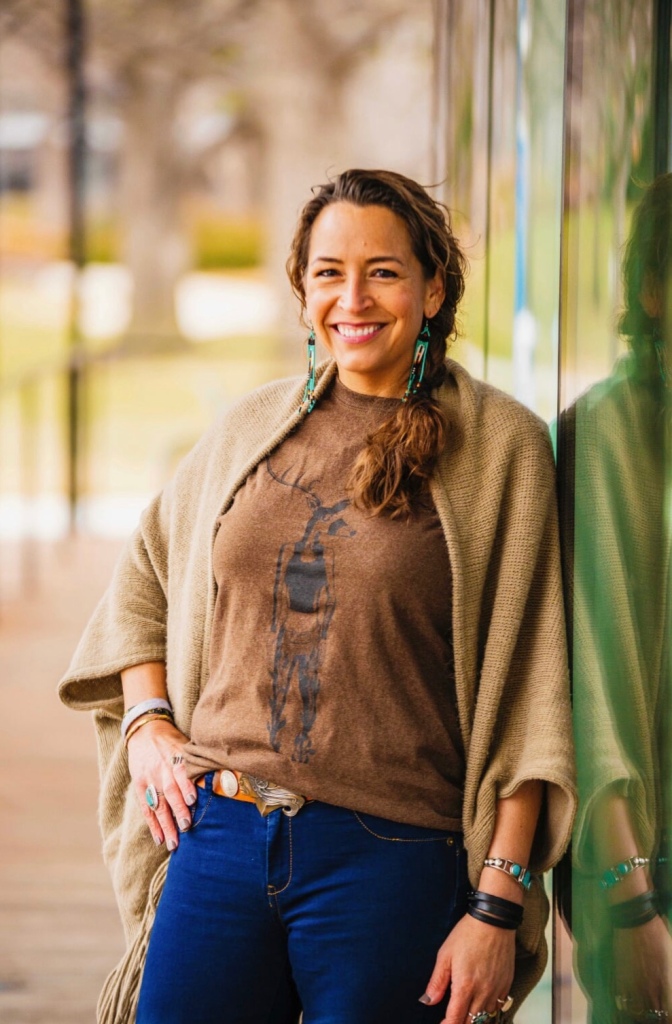
Hollie J. Mackey is an enrolled member of the Northern Cheyenne nation presently located in Southeastern Montana and Associate Professor of Education at North Dakota State University. Her scholarship empirically examines the effects of structural inequity in Indigenous and other marginalized populations in educational leadership and public policy using multiple critical frameworks and methodologies. As an experienced policy consultant, public speaker, program evaluator, and community educator, she seeks to bridge
theory and practice as a means of addressing complex social issues from an interdisciplinary perspective. She is the recipient of the D. J. Willower Center for the Study of Leadership and Ethics Award for Excellence and the Jack A. Culbertson Award for outstanding accomplishments as a junior professor of educational leadership. She serves as the Associate Co-Director for the Barbara L. Jackson Scholars Network at the University Council for Educational Administration and Associate Director of the Consortium for the Study of Leadership and Ethics in Education. She earned her Bachelors and Masters of Science in Public Relations at Montana State University-Billings, Masters of Legal Studies in Indigenous People’s Law at the University of Oklahoma, and Ph.D. in Educational Leadership and Policy Studies at the Pennsylvania State University.
Selected Publications:
Murakami, E., & Mackey, H. J. (Eds.) (2018). Beyond marginality: Understanding the Intersection of race, ethnicity, gender, and difference in educational leadership research. Charlotte, NC: Information Age Publishing.
Mackey, H. J. (2018). Towards an Indigenous leadership paradigm for dismantling ableism. Review of Disability Studies, 14(1), 1 – 12. http://bit.ly/RDSJ_803
Mackey, H. J. (2018).Vengeful equity: Gendering the school-to-prison pipeline. Education Law and Policy Brief Journal, 2(1), 15 – 28.
Mackey, H. J. (2018). Contemporary decolonization: Dismantling policy barriers to systemic equity and self-determination. In R. Papa & S. Armfield (Eds.) The Wiley-Blackwell handbook on education policy (pp. 267-287). San Francisco, CA: John Wiley & Sons.
Mackey, H. J. (2017). The ESSA in Indian Country: Problematizing self-determination through the relationships between federal, state, and Tribal governments. Educational Administration Quarterly. 53(5), 782 – 808. https://doi.org/10.1177/0013161X17735870
Mackey, H. J. (2017). Exploring Native American students’ experiences with injustice: An arts-based approach to improve leadership preparation for equitable schools. National Forum of Educational Administration and Supervision Journal, 35(1/2/3), 49 – 82.
Stamm, M. E., Frick, W. C., & Mackey, H. J. (2016) An analysis of U.S. student drug and alcohol policies through the lens of a professional ethic for school leadership. International Journal of Education Policy and Leadership, 11(1), 1 – 22.
Mackey, H. J. (2015). Going against the grain of accountability: Leadership preparation for using data to promote socially just outcomes. eJournal of Education Policy, Summer, 41 – 56.
Mackey, H. J. (2015). Educational administration in Indian Country: The peculiar position of Indigenous languages, tribal self-determination, and federal policy. In A. Normore, P. Ehrensal, P. First, & M. Torres (Eds.), in Legal frontiers in education: Complex issues for leaders, policymakers and policy implementers. (pp. 167-181). Bingley UK: Emerald Group Publishing Limited.
Mackey, H. J.,& Shannon, K. E. (2014). Comparing alternative voices in the academy: Navigating the complexity of mentoring relationships from divergent ethnic backgrounds. Mentoring and Tutoring: Partnership in Learning, 22(4), 338 – 353.
Mackey, H. J., & Warner, L. S.(2013). For our children: A study of the influences on American Indian/Alaska Native education policy. Journal of Critical Thought and Praxis, 2(1). 104 – 121.
Mackey, H. J. (2012).Transformational partnerships: Translating research into practice through culturally competent evaluation practices in American Indian communities. International Journal of Qualitative Studies in Education, 25(7), 947 – 963.
Mackey, H. J. (2012). Educating American Indian students: Creating a prosocial context. In P. M. Brown,M. W.Corrigan, & A. Higgins-D’Allesandro (Eds.). The handbook of prosocial education, New York, NY: Rowman and Littlefield.
Selected Keynote Addresses and Trainings:
Mackey, H. J. (2019). Montana’s Inaugural Missing Indigenous Persons Task Force Facilitation. Conducted for the Montana Department of Justice.
Mackey, H. J. (2019). Surviving Knowledge: An Indigenous Perspective on Stories, Strategies, and Statistics about MMIP Issues. Invited keynote presented at the Montana Department of Justice joint Law Enforcement/Community Missing Indigenous Persons Training.
Mackey, H. J. (2018). Educational leadership and The ESSA in Indian Country: Self determination and schools as sites of resistance. Invited keynote presented at the Montana State University ILEAD Conference, Bozeman, Montana.
Mackey, H. J. (2018). Qualitative program evaluation. Three day officers’ curriculum/course improvement training presented to the Ft. Sill FIRES Artillery Defense and Air Defense School of Education, Lawton, OK.
Mackey, H. J. (2017). Self-determination in education: Restorying student outcomes through Indigenous leadership and activism. Invited keynote speaker for the Kansas State Indigenous Alliance Indigenous People’s Day Forum, Manhattan, KS. Livestream available at https://www.k-state.edu/indigenous-alliance/indigenous-peoples-day/
Mackey, H. J. (2017). Surviving knowledge: The women of Standing Rock and history rewritten. Invited keynote speaker for the Women’s Research on Women Symposium, College Station, TX.
Mackey, H. J., (2016). A critical legal analysis of colonization on contemporary grassroots activism: On the ground at Standing Rock. Invited presentation, University of Oklahoma College of Law, Norman, OK.
Mackey, H. J. (2014). Federal Indian education policy: Developing vision, creativity, and sustainability through the Johnson O’Malley program. Invited keynote presentation, Oklahoma Statewide Johnson O’Malley Conference, Tulsa, OK.